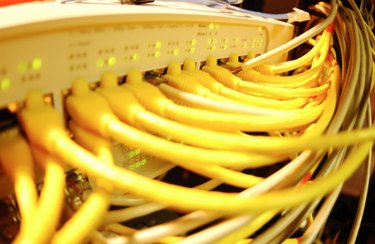
An Ethernet LAN is a Local Area Network constructed following Ethernet standards. Ethernet defines the physical properties of wired networks, including cable types and network data transfer speeds. The standards are renewed periodically, resulting in a range of current recommendations for different grades of networks. The 10/100/1000 reference is description of the data transfer speed that piece of networking hardware can handle.
System Names
The different standards of wired networks defined under the Ethernet name are given a description in the form of an abbreviation. This naming convention gives the data transfer speed, the transmission method and the cable type. So 10BASE-T means that a cable carries 10 megabits of data per second (mbps) over baseband on twisted pair cable. The Ethernet standards progress up to 100 mbps and 1,000 mbps.
Video of the Day
Gigabit
One thousand megabits equals a gigabit. Although Ethernet standards kept the naming convention, listing data rates in terms of Megabits up to the Gigabit speed, after that the system changed. Higher speeds of 10, 40 and 100 Gigabits per second are expressed as 10G, 40G and 100G. A 10GBASE-T exists, which is 1,000 times faster than 10BASE-T.
Network Adapter
Network functions in a laptop or desktop computer are the responsibility of the network adapter. This piece of equipment was originally called a network interface card (NIC) because it was sold as a separate component on a printed circuit board that fit into an expansion slot on the motherboard (main circuit or logic board) of a computer. Because of the widespread use of networking and falling prices of hardware, most computers as of June 2011 are sold with the network adapter integrated into the motherboard. This means that network capability is "built-in" to the computer.
Built-In Ethernet
Built-in Ethernet LAN cards, NICs and network adapters are all the same thing. The network adapter implements all the Ethernet functions on behalf of the computer, translating data from the computer's format to the format required by the network cable. A built-in 10/100/1000 Ethernet LAN card can implement the function of sending data at 10 mbps, 100 mbps or 1000 mbps (one Gigabit per second).